Top 10 Vitamin B12 Foods for Vegetarians
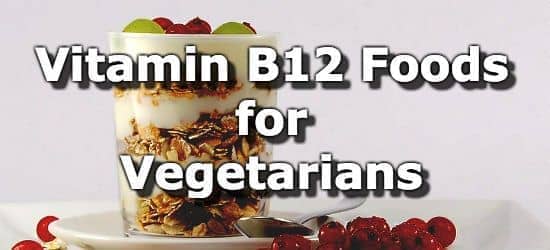
Vitamin B12 is an essential vitamin needed for proper development and functioning of the nervous system. (1)
A deficiency in vitamin B12 can lead to weight loss, constipation, and anemia. Numbness (tingling) in hands and feet may also occur in addition to depression, dementia, and memory loss. (2)
Vitamin B12 is created by bacteria and can only be found naturally in animal products. (1) Fortunately, a wide variety of plant foods are fortified with vitamin B12. Furthermore dairy, eggs, and cheese are all good natural sources of vitamin B12.
Vegetarian foods high in vitamin B12 include fortified cereals, fortified fruit juices, fortified tofu, yogurt, milk, cheese, eggs, vitamin water, and whey powder. The daily value (DV) for vitamin B12 is 2.4mcg per day. In 2016, this was reduced from 6mcg per day, because the scientific evidence shows that 2.4mcg is enough to prevent symptoms of deficiency in the majority of people. (3) For this reason, the percentage of the daily value (%DV) may appear lower on outdated product labels.
Vitamin B12 is a water-soluble vitamin, so the body is able to easily get rid of excess. This is why it's considered a safe vitamin, and there is no established upper limit for consumption. However, extremely high doses can cause bothersome symptoms.
The liver stores enough vitamin B12 to last for several years, which is why it usually takes a long time for a person to realize that they have a deficiency of this vitamin. (4)
Below are the top 10 vegetarian foods highest in vitamin B12. For more see the lists cereals high in vitamin B12, and cheeses high in vitamin B12.
- Introduction
- Top 10 Vegetarian Vitamin B12 Foods
- Printable
- How Much Vitamin B12 Do You Need?
- Which form of vitamin B12 is best?
- What is intrinsic factor and how does it affect vitamin B12 absorption?
- How much Vitamin B12 is in Brewer's Yeast?
- How much vitamin B12 is in Dried Seaweed (Nori)?
- How Much Vitamin B12 is in Mushrooms?
- What are the health benefits of Vitamin B12?
- Does Cyanocobalamin Contain Cyanide?
- If vitamin B12 is only found in plant foods where do cows get vitamin B12 from?
- About the Daily Value (%DV) Target
- About the Data
- Lists By Food Group
- Related
- References
- Feedback
Top 10 Vegetarian Vitamin B12 Foods
 1 Fortified Cereals
1 Fortified Cereals| Vitamin B12 per 3/4 Cup | Vitamin B12 per 100g | Vitamin B12 per 200 Calories |
|---|---|---|
| 6.1mcg (254% DV) | 21mcg (875% DV) | 12.8mcg (535% DV) |
See the full list of 200 Cereals High in Vitamin B12.
 2 Fortified Juice
2 Fortified Juice| Vitamin B12 per Cup | Vitamin B12 per 100g | Vitamin B12 per 200 Calories |
|---|---|---|
| 6mcg (250% DV) | 2.5mcg (104% DV) | 7mcg (293% DV) |
Specific brands high in vitamin B12
- 250% DV in 1 cup (8oz) of Naked Blue Machine
- 108% DV in 1 cup of Bolthouse Farms Daily Greens
- 96% DV in 1 cup of Bolthouse Farms Berry Boost
As with all fortified foods, the quantity of added vitamin B12 can vary, check labels for specific amounts.
See the full ranking of drinks high in vitamin B12.
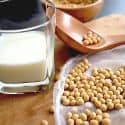 3 Unsweetened Soymilk
3 Unsweetened Soymilk| Vitamin B12 per 16oz Glass | Vitamin B12 per 100g | Vitamin B12 per 200 Calories |
|---|---|---|
| 6mcg (249% DV) | 1.2mcg (51% DV) | 7.5mcg (311% DV) |
Other Milk Substitutes High in Vitamin B12
- 250% DV in a 16oz glass of fortified almond milk
- 250% DV in a 16oz glass of fortified coconut milk drink
- 126% DV in a 16oz glass of rice milk
The quantity of added vitamin B12 can vary greatly, check product labels.
 4 Fortified Tofu
4 Fortified Tofu| Vitamin B12 per Cup | Vitamin B12 per 100g | Vitamin B12 per 200 Calories |
|---|---|---|
| 3.3mcg (137% DV) | 1.5mcg (60% DV) | 3.2mcg (131% DV) |
 5 Low-Fat Milk
5 Low-Fat Milk| Vitamin B12 per 16oz Glass | Vitamin B12 per 100g | Vitamin B12 per 200 Calories |
|---|---|---|
| 2.6mcg (108% DV) | 0.5mcg (22% DV) | 2.1mcg (88% DV) |
See the full ranking of dairy high in vitamin B12.
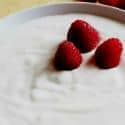 6 Low-Fat Yogurt
6 Low-Fat Yogurt| Vitamin B12 per Cup | Vitamin B12 per 100g | Vitamin B12 per 200 Calories |
|---|---|---|
| 1.5mcg (62% DV) | 0.6mcg (25% DV) | 2.2mcg (91% DV) |
See the full ranking of dairy high in vitamin B12.
 7 Swiss Cheese
7 Swiss Cheese| Vitamin B12 per Oz | Vitamin B12 per 100g | Vitamin B12 per 200 Calories |
|---|---|---|
| 0.9mcg (36% DV) | 3.1mcg (128% DV) | 1.6mcg (65% DV) |
Swiss cheese provides the most vitamin B12 with 36% DV per ounce. On average, cheese provides 15% DV per ounce. See the full list of cheeses high in vitamin B12.
 8 Vitamin Water
8 Vitamin Water| Vitamin B12 per Cup | Vitamin B12 per 100g | Vitamin B12 per 200 Calories |
|---|---|---|
| 0.6mcg (25% DV) | 0.3mcg (10% DV) | 10mcg (417% DV) |
See the full ranking of drinks high in vitamin B12.
 9 Eggs
9 Eggs| Vitamin B12 in 1 Large Egg | Vitamin B12 per 100g | Vitamin B12 per 200 Calories |
|---|---|---|
| 0.6mcg (23% DV) | 1.1mcg (46% DV) | 1.4mcg (60% DV) |
- 63% DV in 1 cup of chopped hard-boiled eggs
Eggs are also a high protein food.
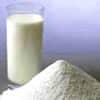 10 Whey Powder
10 Whey Powder| Vitamin B12 per Tbsp | Vitamin B12 per 100g | Vitamin B12 per 200 Calories |
|---|---|---|
| 0.2mcg (7% DV) | 2.4mcg (99% DV) | 1.3mcg (56% DV) |
Printable One Page Sheet
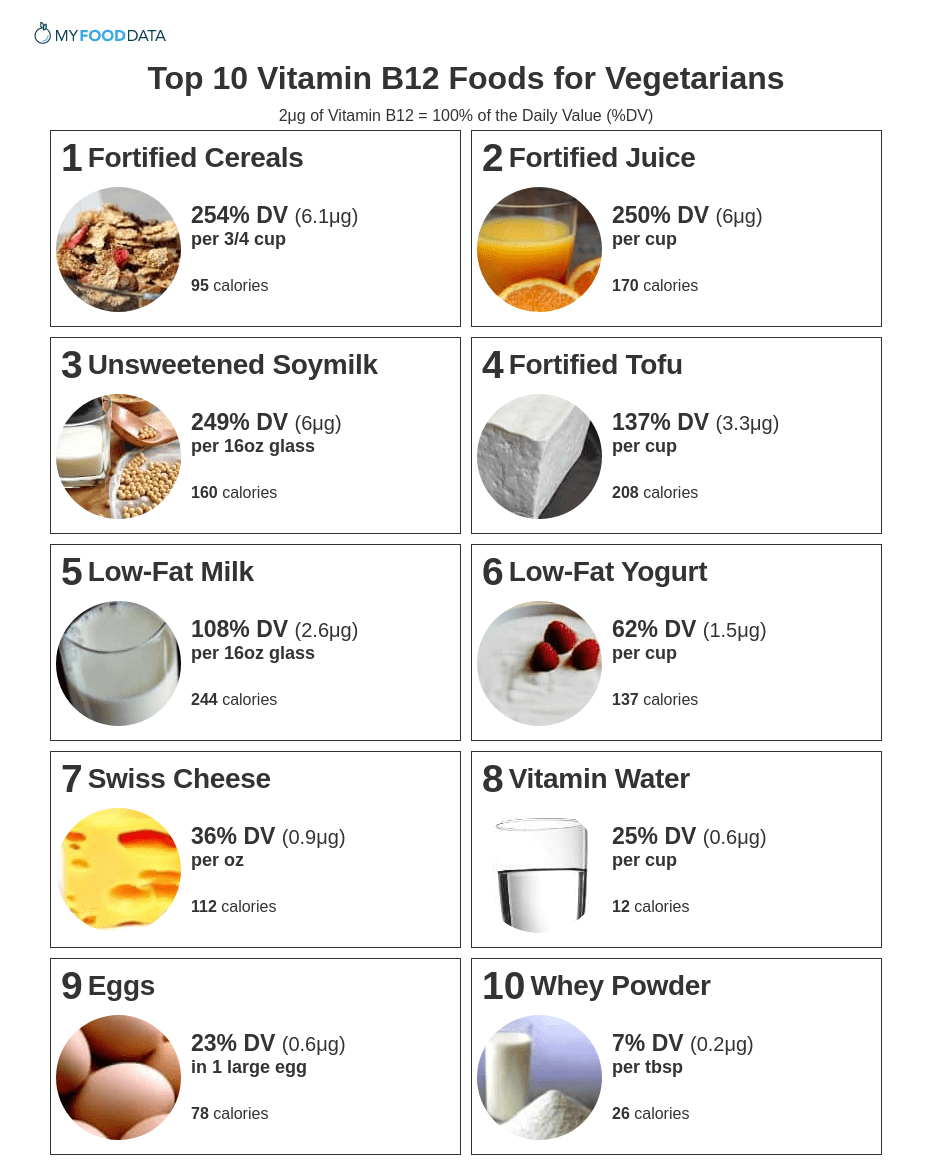
How Much Vitamin B12 Do You Need?
The recommended daily allowance (RDA) for Vitamin B12 ranges from 0.4 to 2.8mcg per day. The daily value (DV) for vitamin B12 is 2.4mcg per day. (3) In 2016, this was reduced from 6mcg per day, because the scientific evidence shows that 2.4mcg is enough to prevent symptoms of deficiency in the majority of people.
| Life Stage | RDA |
|---|---|
| Infants* | |
| 0-6 months old | 0.4mcg |
| 7-12 months old | 0.5mcg |
| Children | |
| 1-3 years old | 0.9mcg |
| 4-8 years old | 1.2mcg |
| Males | |
| 9-13 years old | 1.8mcg |
| 14-18 years old | 2.4mcg |
| 19-50 years old | 2.4mcg |
| 50+ years old | 2.4mcg |
| Females | |
| 9-13 years old | 1.8mcg |
| 14-18 years old | 2.4mcg |
| 19-50 years old | 2.4mcg |
| 50+ years old | 2.4mcg |
| Pregnancy | |
| 14-18 years old | 2.6mcg |
| 18+ years old | 2.6mcg |
| Lactation | |
| 14-18 years old | 2.8mcg |
| 18+ years old | 2.8mcg |
Source: Dietary Reference Intakes for Vitamin B12.
Which form of vitamin B12 is best?
Vitamin B12 comes in multiple different forms, including methylcobalamin, cyanocobalamin, and hydroxycobalamin. All of these forms are bioavailable, and are converted within the body to active forms of the vitamin. Some evidence does suggest that cyanocobalamin may be somewhat more bioavailable than other forms. (5)
What is intrinsic factor and how does it affect vitamin B12 absorption?
Intrinsic factor is a protein produced in the stomach, which is required for the absorption of vitamin B12. This limits the amount of B12 that can be absorbed in the digestive tract. For people whose bodies don't make enough intrinsic factor, very little vitamin B12 can be absorbed. (6)
Because of this, many people receive their supplemental B12 through injections, to bypass the digestive tract and allow the vitamin to enter the bloodstream directly. (7)
Another option is to take very high doses of oral vitamin B12, which has also been shown to be an effective way to address vitamin B12 deficiency in people with pernicious anemia. (8)
Further, an intranasal vitamin B12 gel also exists as a way to boost vitamin B12 levels. Talk to your doctor or primary care provider about this method, if you prefer it over injections. (9)
How much Vitamin B12 is in Brewer's Yeast?
Brewer's yeast is used to brew beer and can be used to make bread. The amount of vitamin B12 in yeast is inconsistent, so it cannot be relied on as a source of vitamin B12 unless it is fortified. Interestingly, a 12oz can of beer does contain 0.07mcg (or 3% of the DV) of the DV for vitamin B12.
How much vitamin B12 is in Dried Seaweed (Nori)?
Nori is the thin dried seaweed wrap typically used to make sushi rolls. Studies have found that nori nori seaweed contains up to 51.7mcg of vitamin B12 in 100 grams. (10) A sheet of nori typically weighs 1.25 grams so a single sheet would provide aabout 0.5mcg of vitamin B12 (8% DV).
While this sounds great, it is unlikely that nori can be relied upon to be a consistent B12 source. While it does make a good addition to a balanced vegan diet, it should not be solely relied upon to provide a person's vitamin B12 needs.
How Much Vitamin B12 is in Mushrooms?
Most mushrooms do not accumulate vitamin B12 in their tissues, and so they're not a good dietary source of this vitamin. Certain mushrooms, including shiitake and lion's mane, have been found to contain B12. However, the levels of B12 in these mushrooms are relatively low, and it would take an unrealistically large amount of daily mushroom consumption to meet the dietary need for B12. (10)
What are the health benefits of Vitamin B12?
- Protection Against Heart Disease - Adequate levels of vitamins B12, B6, and B9 have been shown to lower levels of a protein in the blood known as homocysteine. High levels of homocysteine have been shown to cause damage to blood vessels, and lowering the levels of this substance can help to improve blood vessel function, which in turn may boost cardiovascular health and decrease the risk of heart attacks. (11)
- Protect and Repair DNA to Reduce Cancer Risk and Slow Aging - Absorption of vitamin B12 and Folate (B9) is essential for DNA metabolism and maintenance, which may reduce the risk of cancer and slow down aging. (12)
- Protect Against Dementia and Cognitive Decline - Vitamin B12 is important for nervous system functions, including cognition and memory. Some studies have linked low vitamin B12 levels and high homocysteine levels to an increased risk of cognitive impairment and dementia. In people with vitamin B12 deficiency, replacing B12 has been shown to lead to memory improvements in many cases. Although more research is needed to confirm this association, it's currently believed that maintaining adequate vitamin B12 levels could help to reduce the risk of dementia. (13)
- Energy and Endurance - Vitamin B12 deficiency leads to anemia, low energy, and weakness. (1) Adequate levels of vitamin B12 are necessary to maintain normal energy levels. However, in people who have normal B12 levels, taking extra B12 has not been shown to improve athletic performance or lead to increased energy levels. (14)
Does Cyanocobalamin Contain Cyanide?
Cyanocobalamin is a common synthetic form of vitamin B12 used in supplements and fortified foods. There is a cyanide molecule present in cyanocobalamin. However, the amount of cyanide present even in a very high dose of vitamin B12 is so tiny that it's inconsequential. The cyanide is quickly excreted in the urine without negative effects. (15)
If vitamin B12 is only found in plant foods where do cows get vitamin B12 from?
Cows are not given any form of synthetic vitamin B12. Vitamin B12 is naturally synthesized by bacteria that flourish in certain animals although not in humans. (1) Cows and other ruminants (such as sheep and goats) ferment their food in 4 different stomachs as they digest it. The bacteria involved in this fermentation also create vitamin B12, and this vitamin then enters the animal's flesh and milk.
About the Data
Data for the curated food lists comes from the USDA Food Data Central Repository.
You can check our data against the USDA by clicking the (Source) link at the bottom of each food listing.
Note: When checking data please be sure the serving sizes are the same. In the rare case you find any difference, please contact us and we will fix it right away.
About Nutrient Targets
Setting targets can provide a guide to healthy eating.
Some of the most popular targets include:- Daily Value (%DV) - The daily value (%DV) is a general guideline for consumption that will prevent deficiency of a particular nutrient in most people. The %DV refers to the percentage of an amount that's found in a single serving of a food. It also accounts for absorption factors. It is set by the U.S. FDA.
- Recommended Dietary Allowance (%RDA) - The RDA sets an average daily dietary intake level that is sufficient to meet the nutrient requirements of nearly all (97.5%) healthy individuals. It's more specific than the daily value, and varies by age and gender. The RDA is set by the US National Instutites of Health.
- Reference Dietary Intake (%RDI) -The reference dietary intake is similar to the recommended daily allowance, but is specific to age and gender. The RDI for amino acids is set by the U.N. World Health Organization.
- Adequate Intake (%AI) - This value is primarily used in reference to omega-3 and omega-6 fats. The Adequate Intake is set by the U.S. Institute of Medicine. Because there is less evidence to determine the ideal targets for consumption of these nutrients, the specific amount is considered to be less reliable. Using the term Adequate Intake, rather than one of the other terms, helps to emphasize that the ideal intake of that particular nutrient has not yet been scientifically determined.
See the Guide to Recommended Daily Intakes for more information.
Want to set your own targets? Sign up for an account and set custom targets in the daily meal planner.From the Nutrient Ranking Tool
Use the ranking tool links below to select foods and create your own food list to share or print.
- Foods High in Vitamin B12
- Foods Low in Vitamin B12
- Vegetarian Foods High in Vitamin B12
- Dairy High in Vitamin B12
- Breakfast Cereals High in Vitamin B12
- Fast Foods High in Vitamin B12
View more nutrients with the nutrient ranking tool, or see ratios with the nutrient ratio tool.
Related
Data Sources and References
- Allen LH. Vitamin B12 in health and disease Adv Exp Med Biol. 1994;352:173-86. doi: 10.1007/978-1-4899-2575-6_14. 7832046
- Molloy AM, Kirke PN, Brody LC, Scott JM, Mills JL. Effects of vitamin B12 and folate deficiency on brain development in children Food Nutr Bull. 2008 Jun;29(2 Suppl):S101-11; discussion S112-5. doi: 10.1177/15648265080292S114. 18709885
- U.S.FDA - Daily Value on the New Nutrition and Supplement Facts Labels
- Bastrup-Madsen P. Toxicity induced by multiple high doses of vitamin B12 during pernicious anemia treatment: a case report Scand J Gastroenterol Suppl. 1974;29:89-95. 4530460
- Selinger E, Kühn T, Procházková M, Anděl M, Gojda J. Efficacy of supplementation with methylcobalamin and cyancobalamin in maintaining the level of serum holotranscobalamin in a group of plant-based diet (vegan) adults Nutrients. 2019 Dec 10;11(12):3019. doi: 10.3390/nu11123019. 31835560
- Green R, Allen LH, Bjørke-Monsen AL, Brito A, Guéant JL, Miller JW, Molloy AM, Nexo E, Stabler S, Toh BH, Ueland PM, Yajnik C. Vitamin B12 deficiency Nat Rev Dis Primers. 2017 Jul 20;3:17054. doi: 10.1038/nrdp.2017.54. 28726793
- Oo TH. Vitamin B12 deficiency - A 21st century perspective Clin Med (Lond). 2015 Aug;15(4):402. doi: 10.7861/clinmedicine.15-4-402. 26407399
- Andrès E, Zulfiqar AA, Serraj K, Vogel T, Kaltenbach G. Oral Vitamin B12 Replacement for the Treatment of Pernicious Anemia J Clin Med. 2018 Sep 26;7(10):304. doi: 10.3390/jcm7100304. 30261596
- Serefhanoglu S, Aydogdu I, Kekilli E, Ilhan A, Kuku I. Patient acceptance of intranasal cobalamin gel for vitamin B12 replacement therapy Ann Hematol. 2008 May;87(5):391-5. doi: 10.1007/s00277-007-0406-3. Epub 2007 Nov 9. 17992530
- Watanabe F, Yabuta Y, Tanioka Y, Bito T. Vitamin B₁₂-containing plant food sources for vegetarians J Agric Food Chem. 2013 Jul 17;61(28):6769-75. doi: 10.1021/jf401545z. Epub 2013 Jul 2. 23782218
- Larsson SC, Traylor M, Markus HS. Homocysteine, B vitamins, and cardiovascular disease: a Mendelian randomization study Ann Neurol. 2019 Apr;85(4):495-501. doi: 10.1002/ana.25440. Epub 2019 Mar 11. 30785218
- Fenech M. The role of folic acid and Vitamin B12 in genomic stability of human cells Mutat Res. 2012 May 1;733(1-2):21-33. doi: 10.1016/j.mrfmmm.2011.11.003. Epub 2011 Nov 7. 22093367
- Malouf M, Grimley EJ, Areosa SA. Low Vitamin B12 Levels: An Underestimated Cause Of Minimal Cognitive Impairment And Dementia Cochrane Database Syst Rev. 2003;(4):CD004514. doi: 10.1002/14651858.CD004514. 14584018
- Bourre JM. Vitamins and Minerals for Energy, Fatigue and Cognition: A Narrative Review of the Biochemical and Clinical Evidence J Nutr Health Aging. 2006 Sep-Oct;10(5):377-85. 17066209
- Ramezanpour Ahangar E, Annamaraju P. Cyanocobalamin 2023 May 29. In: StatPearls [Internet]. Treasure Island (FL): StatPearls Publishing; 2023 Jan–. 32491564
Try the recipe nutrition calculator, or daily meal planner.
Create a free account to log and track foods.

